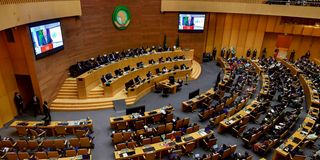AU summit: What lies beyond the nice spectacle of Addis meeting

In this past photo, United Nations Secretary General Antonio Guterres addresses Presidents and delegates via a telecast at the African Union headquarters during the 35th Ordinary Session of the African Union (AU) Summit in Addis Ababa, on February 5, 2022.
It's that time of the year when Addis Ababa plays host to the Heads of State and Government of African Union (AU) member States. Foreign Ministers making up the Executive Council of the AU were first to congregate in Addis Ababa on February 15 and 16.
In a push to assert African agency, the Chairperson of the Executive Council, Senegal’s foreign Minister Aïssata Tall Sall, told participants during the opening session that Africa expects to "be heard, consulted and, most of all, respected in the choices it makes".
The leaders of AU member states descended on Addis Ababa on February 17 and held the ordinary session of the Assembly of the AU in the days that followed.
The composition of the leaders of the continent, which is reflected in the family photo they take after the opening session, shows that nearly all of them are men. It is only the presence of Tanzanian President Samia Suluhu that restrains observers from concluding that the Assembly is an men only club. I don’t know whether to say bless the Tanzanians or praise God or perhaps both for making her ascent to the helm possible.
I have a dream that one day, hopefully in the time of my daughter's generation, we will have a family picture of the leaders of the continent that is more balanced and reflects the average age of people on the continent!
This is not to say that Africa has not made progress. I was at a dinner recently where I was reminded about the OAU times and the progress made in the last few years. For instance, unlike the OAU times when it was not uncommon for some leaders to attend the summit in their military uniforms, today, all of them smile in front of the camera in their suits, courtesy of the bloc banning coups and other unconstitutional changes of government.
Indeed, even those who seized power militarily will show up in their best business formal.
Of course, all five leaders except one who seized power by military coup in 2021/22 are barred from participating at this upcoming summit. Curious to know this one military strongman is? If you don’t know, are you sure that you are interested in African affairs?
But in addition to gender inclusivity of the AU Assembly, the subject of who attends AU summits continues to be a topic of discussion. For example, civil society organizations, who would have liked to seize the occasion to champion specific issues of concern on behalf of Africans, could benefit from having a slot for a representative of CSOs to make a statement at the opening session and interact with leaders on the corridors of the AU.
I hope that in the steady progress to achieve agenda 2063, we will one day see a representative of African citizens bringing the voice of regular Africans to Mandela Hall. And allow me to dream that we will also make the AU a union of the people and not just that of states and governments!
Access to the AU during the summit is also a subject of discussion among AU partner countries, more so this year. The AU sent a note inviting partner countries to attend the opening session on the basis of 1+0 representation, signaling to partners not to bother with bringing to Addis Ababa high-level representatives from their capitals.
While this means that partner countries would not be able to interact with as many leaders as they could, for the AU this ensures that it spares the leaders from attending the summit with divided attention. Yet, it remains an issue for which workable formula is yet to be found.
It is also curious if this 1+0 invitation has been extended to Israel whose AU observer status has been in dispute, triggering a Heads of State and government taskforce for which there is so far no record of any convening since its establishment. In the meantime, the lobbying from Israel is in full swing in Addis Ababa. Come this weekend, we may know if there is any resolution to this dispute, although the AU should not have been put in this situation in the first place considering the many continental issues that it should invest its time and attention to.
The other issue of attendance concerns which of the African leaders will make their pilgrimage to Addis Ababa or delegate it to their minister. This summit is billed to be one that will attract the attendance of large number of African leaders. Even if this were to happen, barring any intervening factors, you should not hold your breath that we will have as many African leaders as those who attended the EU-AU, China-Africa and US-Africa summits.
I dearly wish that they all come for their summit, demonstrate their pan-African commitment to the AU and its ideals. And prove me wrong.
Solomon Ayele Dersso is the founding director, Amani Africa





